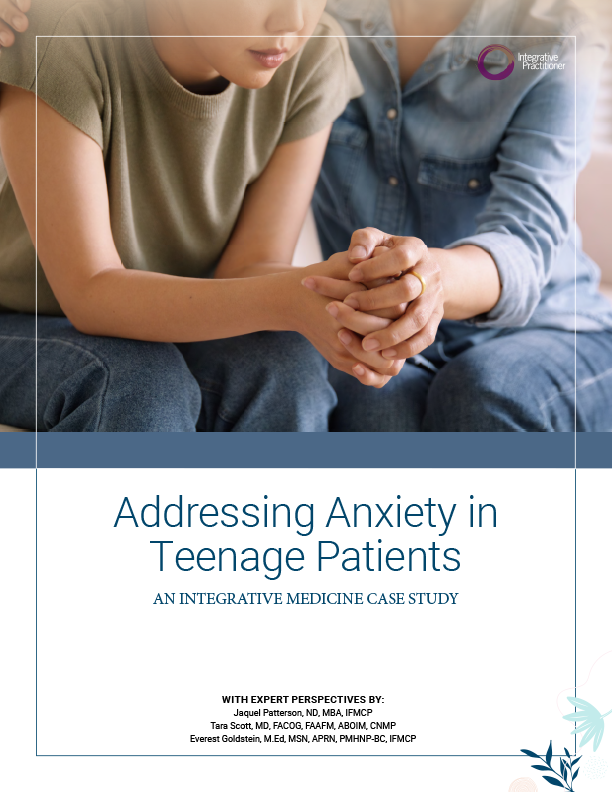Filters
Product Categories
Presented by: Deborah Mcelligott, DNP, ANP-BC, AHN-BC, HWNC-BC, CDE, Dena Alberti, MSN, RN-BC, Susan Penque, PhD, RN, CNP, and Joanne Turnier, DNP, RN, ACNS-BC, HN-BC, HWNC-BC, CT
The GO TO IT Model for patient-centered care may have the potential to serve as a framework for program implementation within hospitals and health care systems.

Addressing anxiety in teenagers is a complicated, individualized process that cannot be fixed with a one-size-fits-all approach.
In this case report, experts work with a female teenage patient struggling with anxiety and acne. This report highlights nutrition, supplement, and lifestyle recommendations for balancing female hormones and improving mood, featuring expert perspectives from Jaquel Patterson, ND, MBA, IFMCP, Tara Scott, MD, FACOG, FAAFM, ABOIM, CNMP, and Everest Goldstein, M.Ed, MSN, APRN, PMHNP-BC, IFMCP.

Presented by: David Brady, ND, DC, CCN, DACBN, IFMCP; Nancy O’Hara, MD, MPD, FAAP; David Perlmutter, MD, FACN, ABIHM; Yehuda Shoenfeld, MD, FRCP, MAACR; and
Autoimmune disease is growing at epidemic proportions in the Western industrialized counties, with a very strong predominance of women being affected. A phenomenon not observed in the under-developed world. It is becoming very clear that autoimmune disease is a complex entity and may represent the result of a “perfect storm” of biological and environmental factors and that a systems-biology approach, utilizing a wider-lens perspective, will be required as these subjects are approached clinically.

Sleep disorders are epidemic around the world, and in the U.S. alone sleep apnea represents a $200 billion a year burden to the U.S. economy. Every medical professional and health and wellness provider must understand the impact of sleep on health, unfortunately, sleep is often overlooked as one of the supporting pillars of health if not it’s foundation.

Presented by: Robert Silverman, DC, DACBN, DCBCN, MS, CCN, CNS, CSCS, CIISN, CKTP, CES, HKC, FA
The gut and the brain are two separate, but connected, organs. When the gut is dysfunctional due to microbiota imbalance, it has been shown to manifest as a neurological disorder. Equally, within hours of a traumatic brain injury, the gut is inflamed. When the gut is inflamed, the intestinal barrier breaks, allowing for the translocation of microbial antigens into the bloodstream. In response to the microbial or dietary antigens, the immune system produces autoreactive antibodies, which can infiltrate the broken blood-brain barrier and trigger neuroautoimmunity.

Stress, Adrenal Health, and Cannabidiol: The HPA-ECS Connection

How to Build a Successful Virtual Dispensary

Presented by: Roberta Stanhope, ARNP, PMH, CNS, BC
This presentation will examine the role of integrative health and holistic wellness in combating the loneliness pandemic. Topics include issues of overprescribing and overdiagnosis within the context of traditional clinical health settings. This presentation will provide examples of holistic tools that practitioners can use to support mental health including the use of targeted pharmaceutical therapy for optimal outcome management.

Presented by: Nicola Finley, MD
Health disparities negatively impact the health and wellbeing of communities of color and a leading cause of health disparities is social determinants of health. These social determinants of health contribute to health inequalities for Black, Hispanic, and Native American communities.
This presentation will outline the various factors that contribute to social determinants of health and its effects on medical conditions like COVID-19, heart disease, cancer among other conditions. Implicit bias can play a role in health disparities; strategies will be discussed on how to reduce this bias. Lastly, alternative medicine practices in communities of color will be discussed as well as how wellness can help in achieving health equity.
This presentation was recorded at the 2022 Integrative Healthcare Symposium Annual Conference.

Medicine is undergoing a major paradigm shift from a reactive, organ based diagnosis and disease management system to an engaged, proactive, molecularly based systems approach. This is being called “4P Medicine: Personalized, Predictive Preventive and Participatory.


















